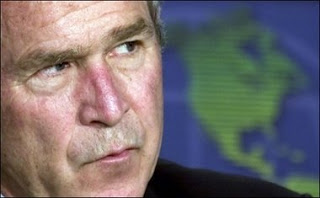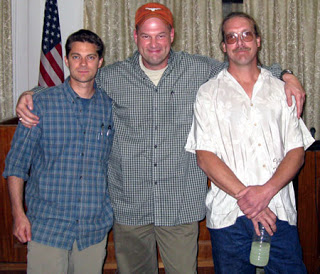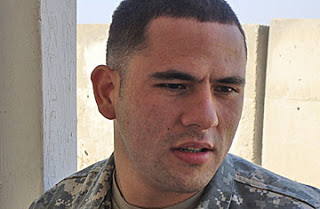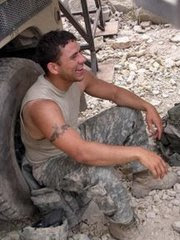Thursday, January 8, 2009
Seeking Clemency from a War Criminal: The Case of Evan Vela Carnahan

George W. BUSH: One of the major theaters against al Qaeda turns out to have been Iraq. This is where al Qaeda said they were going to take their stand. This is where al Qaeda was hoping to take– Martha RADDATZ: But not until after the U.S. invaded. BUSH: Yeah, that’s right. So what?
President Bush’s interview on ABC News in Baghdad, December 15.
Sgt. Evan Vela Carnahan, 25, has served roughly one year of a ten-year sentence at the Ft. Leavenworth Military Prison. In November 2007, he was convicted of murdering an Iraqi civilian named Genei Nasir Khudair al-Janabi, whom he killed with a single shot to the head from a 9mm sidearm.
The killing took place just a few hundred feet from Janabi’s home, which is located in a Sunni-dominated neighborhood in Baghdad near Iskandariyah in a region sometimes called the “Triangle of Death.” Evan admits that he killed Janabi in compliance with a direct order issued by his squad leader. The squad leader — who was acquitted of a murder charge — admits that he gave the order, and stated under oath that he would have killed Janabi himself except for the fact that Evan was the one with the pistol in his hand.
During the past six years, the Bush Regime has followed an inverted Nuremberg formula — call it the “Abu Ghraib Doctrine” — under which the legal accountability for war crimes resides only with those at the bottom of the chain of command. To palliate public opinion in Iraq, a handful of low-ranking soldiers were sent to prison after the Abu Ghraib atrocities were made public.
Evan Carnahan was sent to prison for much the same reason: The killing of Janabi, which took place on May 11, 2007, came just as the much-heralded “surge” began, a program in which U.S. occupation commanders pacified the Sunni Triangle by bribing the leaders of the Sunni insurgency.
Curtis Carnahan, Evan’s father (and a close personal friend of mine from High School), told Pro Libertate that “the Iraqi Human Rights Minister was present at every session of Evan’s military trial, which the Army insisted on holding in Baghdad…. The trial didn’t begin until November [of 2007], after Evan’s unit had returned to Alaska. They could have brought Evan back to the United States, and we repeatedly filed motions to have the trial moved stateside. Instead, the Army, at great unnecessary expense, held the trial in Iraq, under the constant scrutiny of Iraqi officials. It’s clear to me that Evan was being used as a scapegoat, as a political sacrifice, in order to appease Iraqi government officials.”
Evan was part of a five-man sniper team that had implanted itself in a “hide” behind an earthen berm. Over the previous four days the team had been able to sleep no more than 3-4 hours during each 24-hour cycle, and what sleep they had was divided into fifteen-minute segments. This was typical of the 56 missions Evan’s team had carried out under Staff Sergeant Michael A. Hensley, an Expert Marksman tasked to increase the “kill rate” of suspected “insurgents” in the area.
Hensley — described in an Esquire story as a twitchy, tatooed collection of eccentric mannerisms and nihilistic opinions — was one of the most proficient snipers in the U.S. Army, a “natural-born killer.”
Evan was adopted by Curtis (who runs a printing business in eastern Idaho) as a child. The Army insists on calling him Sgt. Vela because of a clerical matter involving his Social Security Card. He was, by all accounts, an exemplary soldier who did not check his conscience at the door when he left for combat.
Before shipping out for Iraq, Evan expressed his ambivalence about killing Iraqis to his LDS (Mormon) Bishop. The spiritual counsel he received, as encapsulated in a videotape prepared by church authorities, was that he would not be held accountable by God for shedding the blood of Iraqis as long as he went to war “in a spirit of love.”
This is anodyne advice of no practical or moral value in a war of aggression in which every U.S. soldier who kills in self-defense is actually committing murder. Since the U.S. government had no moral right or legal authority to invade Iraq, U.S. military personnel in that country are the equivalent of robbers suddenly confronted by an armed homeowner: A robber in that situation has no right to defend himself by force.
This isn’t to say that every American serviceman in Iraq intended to behave like an armed robber, or that they deserve to be killed. It is to say that they shouldn’t have been sent there in the first place, and that justice requires not only that we totally withdraw from Iraq but also prosecute and punish of those responsible for planning and ordering the invasion.
Evan’s case offers a particularly poignant example of the multi-layered injustices that have blossomed from the Bushling’s unnecessary war.
Early on the morning of May 11, Evan — who had been assigned guard duty, but (given his human limitations) inevitably found himself dozing off — awoke to find himself staring into the startled face of Genei al-Janabi, who had stumbled onto the sniper squad’s “hide” on his way to fetch water. The squad soon awoke, and Janabi was taken prisoner. Shortly thereafter, Janabi’s teenage son materialized and was likewise taken into custody.
Hensley now confronted a predicament. His squad had been sent to ferret out suspected insurgents in what was, at the time, a very active battle zone. Their position had been compromised, and the elder Janabi, understandably terrified, began to thrash and cry out for help. Helmsley decided to release the son. As soon as the teenager had departed, Hensley turned to Evan and ordered him to kill Janabi. Evan did as he was ordered.
Immediately thereafter, Hensley ordered the squad to plant an AK-47 on Janabi’s dead body. He also began to concoct cover story; this involved multiple spurious radio calls to Lt. Matthew Didier at the squad’s patrol base describing concerns about a suspected insurgent and requesting permission to kill him.
The killing of Janabi, Hensley later explained, “is legitimate to me; it’s not legitimate to the law. So I [had] two choices. I can do something illegal, like put a gun on him, or I can go to jail for murder. I don’t know where you stand ethically on all of that, but that is what it is. And if doing something that is a little dishonest keeps me and my men from going to jail one day, I am going to be a little dishonest. If the law causes my men to get killed, the law will be broken. If lying prevents me from going to jail, I’m going to lie.”
Al-Janabi, Hensley insisted, had to die because he was “making too much f*****g noise” and thus imperiled the lives of his men. As a field commander, Hensley decided that the Iraqi, who was in his own neighborhood, looking for water on his own property, “had no right to be there, he was a bad guy, he deserved to die.”
So he ordered Evan Carnahan to shoot the man in the head. And Carnahan, trained by the military to obey reflexively, and taught by his church leaders that obedience to authority expunges the taint of criminal actions, pulled the trigger, believing that his action was legally sound and morally right.
After the Sunni Buy-Out — aka “Surge” — began, the shooting of Janabi became a local political controversy, and the Army sicced the Criminal Investigative Division on Hensley and his squad. Hensley, whose conscience is as flexible as a Cirque du Soleil performer, brazened out the interrogation.
Evan broke down under questioning. He was offered immunity to testify against Specialist Jorge Sandoval and S. Sgt. Hensley. Both Sandoval and Hensley were acquitted of murder and convicted of lesser offenses. Both of them were given sentences equivalent to time already served in pre-trial detention.
Despite his immunity agreement, Evan was brought to trial. Hensley — who, having been acquitted of murder, had nothing to lose — testified on Evan’s behalf. He eagerly, perhaps even giddily, admitted to being the instigator of Janabi’s death, describing Evan’s role as merely that of carrying out what the soldier believed to be a lawful order.
Curtis Carnahan, who made three long, expensive trips to Baghdad for Evan’s pre-trial hearings and criminal trial, told me that the eight-member trial panel who heard the case “was hand-picked by General Rick Lynch,” the appropriately surnamed commander of the 3rd Infantry Division, whom Carnahan describes as “a smug, narcissistic son-of-a-bitch.” Lynch’s priority at the time was to placate Iraqi officials. This was necessary, in turn, to ensure the “success” of the “Surge,” which itself was intended to neutralize growing American antipathy toward the war.
Given all of these considerations, someone had to be fed to the wolves, and Evan happened to be the only suitable candidate.

According to Curtis, the Army had a file on Janabi suggesting that “he was a bad guy. And several people with detailed knowledge of the region have developed intelligence confirming that the al-Janabi tribe was either active in al-Qaeda, or collaborating with them.”
Of course, just days after Janabi was killed, collaborating with suspected al-Qaeda operatives became official U.S. military policy in Iskandiriyah. It’s also worth recalling the exchange quoted in the epigram above, in which George W. Bush, when confronted with the charge that it was his invasion and occupation of Iraq that resulted in Iraq becoming infested with al-Qaeda, replied: “So what?”
Bush infused those two syllables with his proprietary blend of bellicose ignorance and arrogant dismissiveness. Yes, he was admitting, the invasion created a morass of guerilla violence and a breeding ground for terrorism where none previously existed — but that’s not important. The implicit question is: If this isn’t important — if there were no WMDs, and the invasion actually enhanced the terrorist threat — why did the U.S. invade Iraq?
An observation offered Curtis Carnahan is suggestive of an answer.
“Everything I saw while I was over there suggests that they’re not going to pull out,” Curtis told me. “There was construction going on everywhere — more buildings, more concrete, more everything at Camps Victory and Liberty. They’re definitely settling in for a long haul.”
This underscores the fact that the invasion and occupation of Iraq was pure military colonialism. It wasn’t intended to “liberate” a country long ruled by a U.S.-installed surrogate thug, much less to protect the United States and its inhabitants from any “threat” posed by that tiny, insignificant country. The objective was always to seize control over Iraq and use it as a staging base to assert military and political control over the region’s energy resources — an objective that will be followed irrespective of the new agreement with “independent” Iraq.
Curtis, as I mentioned earlier, is an old friend of mine (he was, in fact, my vice president when I was president of the Madison High School Class of 1981). He sees the war in starkly different terms than I do, insisting that the correct approach is to “cut off their heads and crush them — we should be acting like a conquering army, forcing them to submit to our will.” Like many other people I know, including many I love and respect, he doesn’t appear troubled by the prospect of living under a government capable of exercising powers of the sort he describes. But due to what his son has experienced, Curtis does have a better understanding of the incurable corruption that infects every element of the Regime that rules us.
She’s not saying “Bush is Number One!” Evan Carnahan’s sister, during a visit to Mordor, expresses her opinion of George W. Bush and the Regime he briefly ruled. (Photo courtesy of Curtis Carnahan.)
To justify an act of murder, Hensley fixed the “facts” around his decision to justify the killing. This was perfectly in harmony with the conduct of his Commander-in-Chief. When that decision created a local public relations problem, the soldier who pulled the trigger was offered as a sacrifice to political expediency; this, too, is perfectly in accord with Mr. Bush’s priorities.
Among the clear lessons taught by this abhorrent case is this: Those who understand and cherish individual liberty should never allow themselves to become the agents of another person’s will.
Evan Carnahan is merely one of countless thousands of fundamentally decent Americans whose earnest patriotism led them to participate in a world-historic crime. Unlike most of them, however, Evan is now in prison while those who used him to carry out that crime are free — and his only hope for freedom, at present, is an act of clemency from the War Criminal in the White House.
On sale now.
Dum spiro, pugno!
Content retrieved from: http://freedominourtime.blogspot.com/2009/01/seeking-clemency-from-war-criminal-case.html.






























